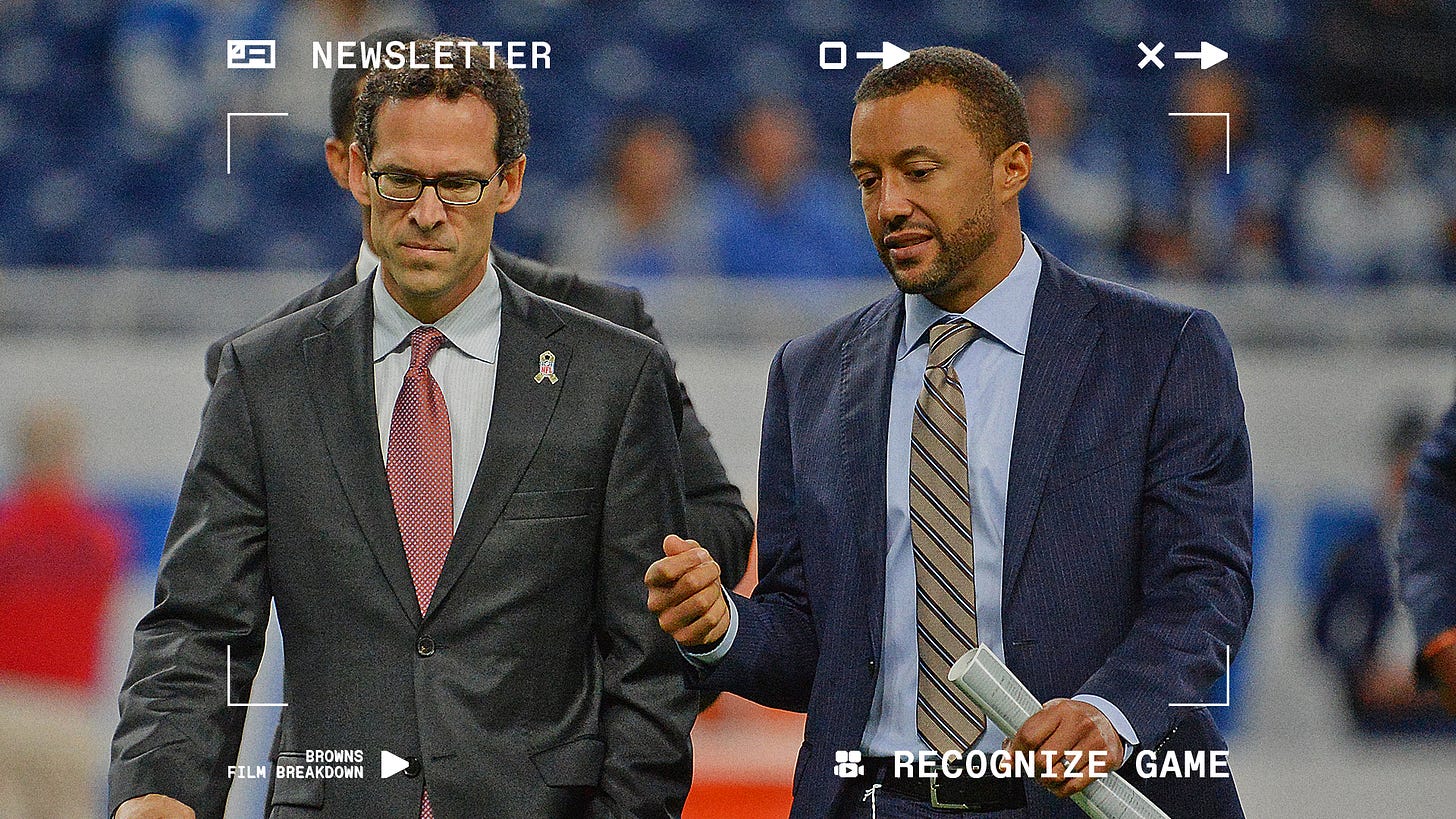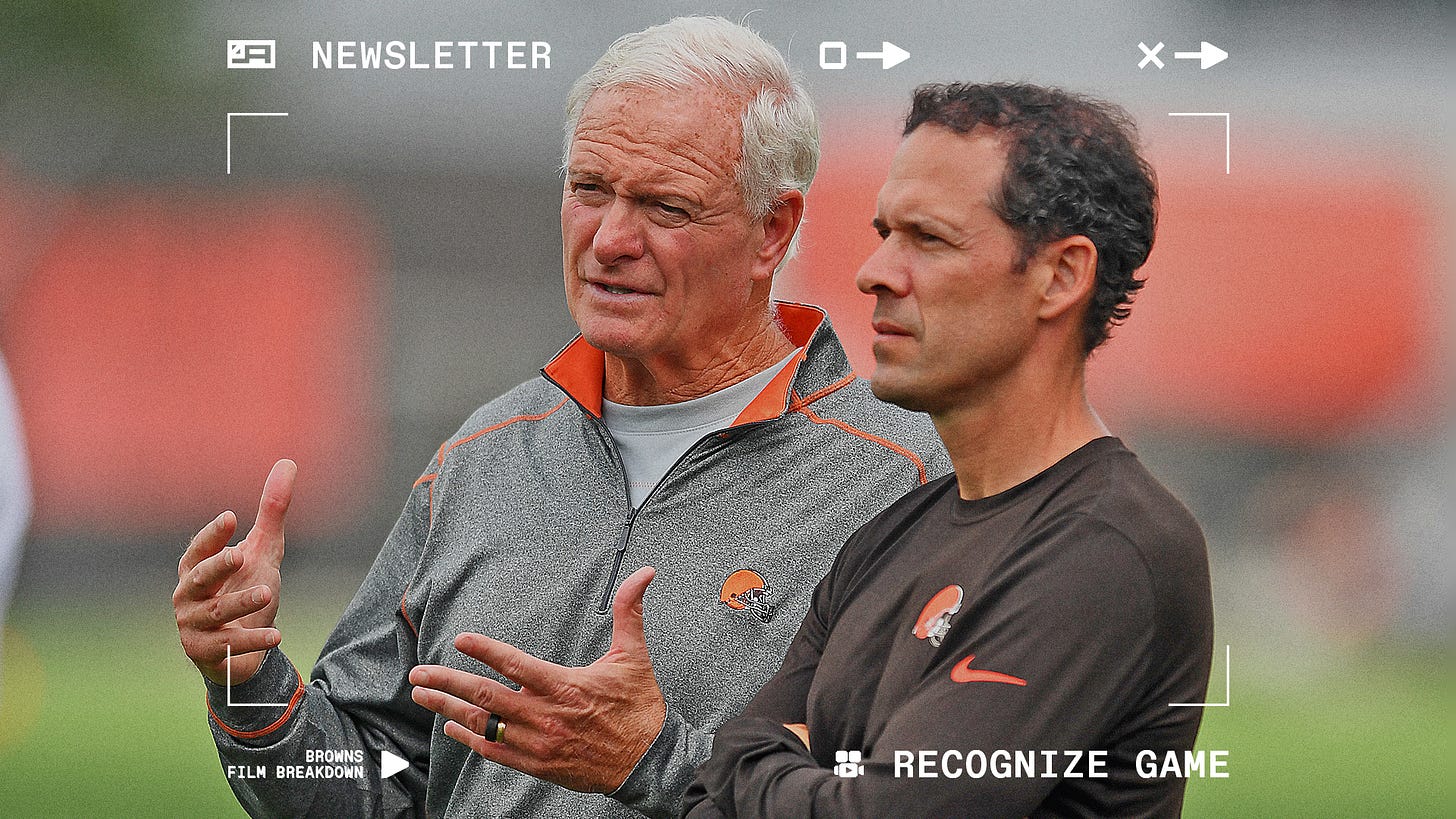The Opening Drive 11/8: DePodesta’s Departure Marks the End of a Divisive Era
With DePodesta gone, the Browns can finally get back to a better brand of football, where analytics are a tool, not the guiding force.

Paul DePodesta’s time with the Cleveland Browns has come to a close, ending one of the most debated chapters in the franchise’s modern history. The longtime Chief Strategy Officer is leaving the organization to take over baseball operations for the Colorado Rockies, bringing his ambitious but uneven tenure in Cleveland to a definitive end.
DePodesta arrived in 2016 as a forward-thinking architect meant to revolutionize how the Browns operated. His background in analytics and his “Moneyball” reputation promised a data-driven approach to team building, one that would bring discipline and innovation to a franchise long defined by chaos.
Yet after nearly a decade, the results never matched the expectations. The Browns’ record during his tenure of 56 wins, 99 losses, and one tie, reflected inconsistency and missed opportunities. Over the years, DePodesta’s influence became something of a mystery even inside Berea. His title carried weight, but his exact role often remained unclear to those outside the building.
To many fans, he became a symbol of the team’s frustrating stagnation, an unseen strategist whose plans rarely translated into wins. Supporters, however, argued that he provided structure and long-term vision in an organization constantly disrupted by coaching changes, ownership shifts, and internal friction.
What’s undeniable is that DePodesta’s approach reshaped how the Browns thought about team construction. His emphasis on analytics, efficiency, and strategic alignment influenced both front-office hiring and roster philosophy. But as the seasons passed without sustained success, even the most disciplined plan began to feel more theoretical than transformational.
His departure now leaves the Browns at another crossroads. Whether this moment sparks a genuine change in direction or simply another reshuffling of leadership remains to be seen. In many ways, DePodesta’s tenure encapsulates the Browns’ modern era, marked by big ideas, bold intentions, and unfinished business. In the end, he leaves a decade of Browns football that had some flashes of success but never delivered on its promise.
Below you’ll find the latest in the BFB catalog for supporters to dig into. Click the link to become a supporter if you haven’t already, and enjoy all the latest from Browns Film Breakdown.
Latest Podcasts:
Final Week 10 Updates, Founders Questions, CFB Preview and Picks
Thoughts on Paul DePodesta Leaving, and 2025 First Half Superlatives
Latest Film Rooms:
Latest Articles:
Opening Drive 11/6: Get Comfortable with the Browns Draft Slot
Opening Drive 11/5: Jets and Browns Choose Different Deadline Pathway

…football isn’t baseball. Culture, chemistry, and leadership can’t be quantified, and success can’t be simulated in a spreadsheet.
Paul DePodesta’s departure from the Cleveland Browns should be seen for what it truly is: an opportunity to correct the direction of a franchise that has spent nearly a decade entangled in overthought philosophies. His move to the Colorado Rockies isn’t a loss for the Browns; rather, it’s a chance to eliminate a layer of strategic paralysis that has prevented the team from reaching its full potential.
DePodesta was brought to Cleveland in 2016 as a disruptor, the “Moneyball” mind from baseball who would bring data-driven decision-making to football. On paper, it sounded revolutionary. In practice, it became a bureaucratic maze of analytics, spreadsheets, and process-driven indecision. The Browns’ front office often appeared paralyzed by analysis, struggling to balance gut instinct with statistical models. Drafts under DePodesta’s influence produced some hits like Myles Garrett, but also glaring misses and countless overcomplicated moves. The team’s 56-99-1 record during his tenure speaks louder than any algorithm ever could.
While DePodesta was officially stationed on the West Coast, his long-distance leadership reflected a broader problem, a disconnect between strategy and the locker room. Football is a game of immediacy, emotion, and instinct, not just trends and percentages. DePodesta’s remote influence often clashed with the realities on the ground in Berea, creating friction between coaching staffs and executives. The Browns cycled through coaches and general managers under his strategic oversight, each supposedly aligning with his long-term vision. While real stability was never fully achieved, the Browns became a case study in theoretical football, always planning for a future that never arrived.
Cleveland’s greatest successes have come when the team has embraced clarity and toughness. The 2020 playoff run under Kevin Stefanski was built on identity, not ideology. It wasn’t analytics that won in Pittsburgh that January night; it was aggression, unity, and execution. For too long, DePodesta’s influence blurred the Browns’ football identity. Every decision seemed to pass through a filter of approval, risk analysis, and philosophical debate. In a sport that rewards decisive leadership, the Browns were led by a strategist who preferred spreadsheets.
DePodesta’s exit opens the door for football minds, people with both experience and instinct, to reclaim control of the Browns’ direction. The question now becomes, will Haslam elect to allow the current regime to stay, or is Depodesta the first domino? Either way, leadership must be able to operate independently of an overarching strategist dictating the model. This doesn’t mean analytics should be abandoned; they’re part of every modern franchise. But in Cleveland, analytics have become the identity. That imbalance stifled the very creativity and toughness the Browns were trying to cultivate.
DePodesta’s Cleveland experiment was noble in theory but flawed in execution. His ideas were ahead of their time, but football isn’t baseball. Culture, chemistry, and leadership can’t be quantified, and success can’t be simulated in a spreadsheet. By parting ways, the Browns aren’t losing their architect; they’re freeing themselves from an ideology that stopped serving them. DePodesta may thrive back in baseball, where his analytical instincts are better suited. In Cleveland, though, it’s time to return to the fundamentals, football people making football decisions.
Analytics are an excellent tool, but football is a blend of instinct and intellect. It combines the thrill of the body, the calculations of the mind, and the attachment of the heart. It’s more than just a game; it reflects human nature itself, showcasing competition, cooperation, emotion, and identity all in motion.
Browns Film Breakdown will return soon with some content you deserve.






Awesome article!